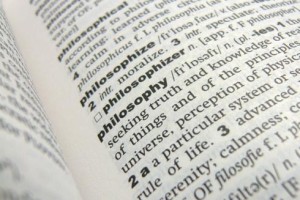Determinism: The belief that everything that happens in the universe is fixed in advance.
Dualism: The belief that the universe consists of two different things (mind and matter).
Empiricism: The belief that experience is the source of all knowledge.
Ethics: A branch of philosophy that tries to answer questions about right and wrong.
Existentialism: The idea that people create themselves and their experience by the choices they make.
Extension: The way in which an object fills up (extends into) space.
Hedonism: The belief that pleasure is the most important thing in life.
Idealism: The view that the material world is produced by the mind.
Logic: The study of what constitute a sound argument.
Materialism: The view that matter is the only substance that exists and that the mind cannot exist independently from matter.
Monism: The belief that the universe consists of one ultimate substance.
Ontology: The study of what kinds of things actually make up the universe.
Paradigm shift: A change in the framework within which scientific theories are constructed.
Paradox: A statement that contradicts itself. A well-known example is the Iranian who says, “All Iranians are liars”.
Phenomenology: The study of How things appear (as opposed to how we think they appear).
Pluralism: A belief that reality is composed of more than one basic substance.
Pragmatism: The view that the truth and value of ideas depend on how useful they are in real life.
Rationalism: The theory that truths about reality can be deduced by reason alone.
Scepticism: A belief that it is impossible to know anything about the world with certainty.
Syllogism: A deductive argument made up of three statements, the last of which is the logical conclusion of the other two.

